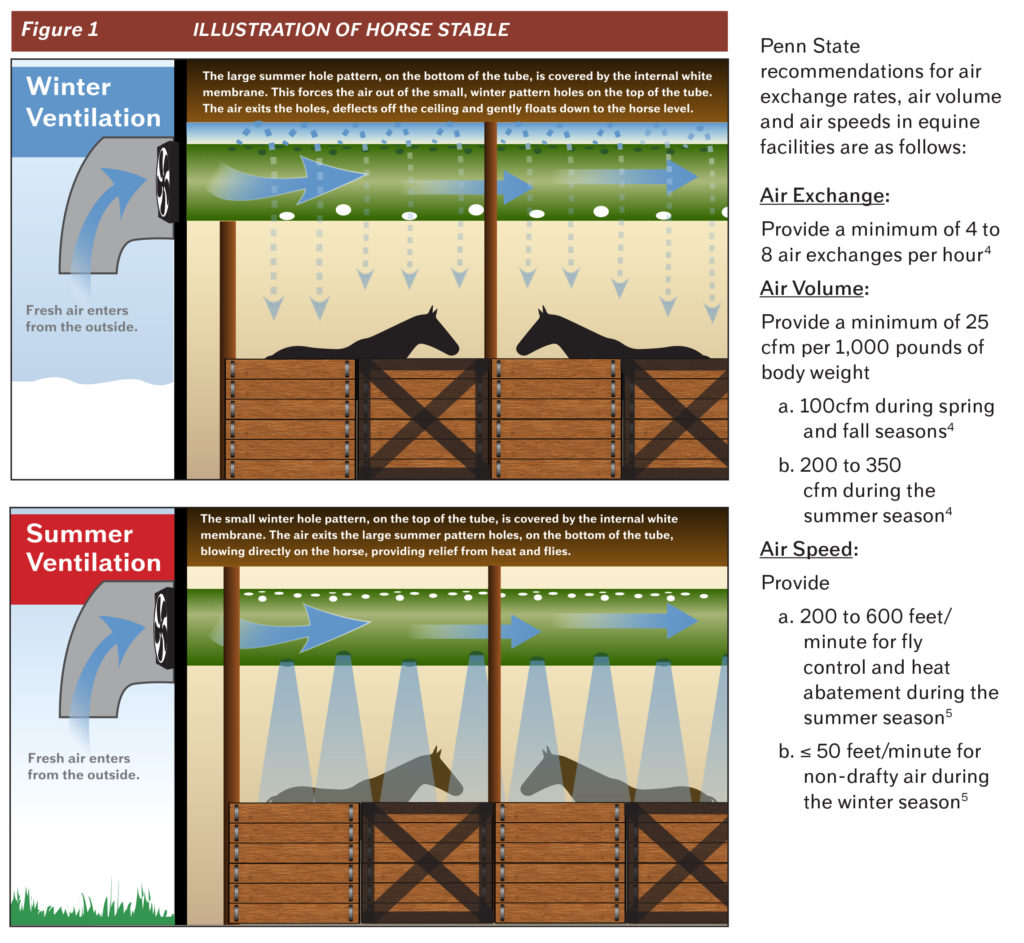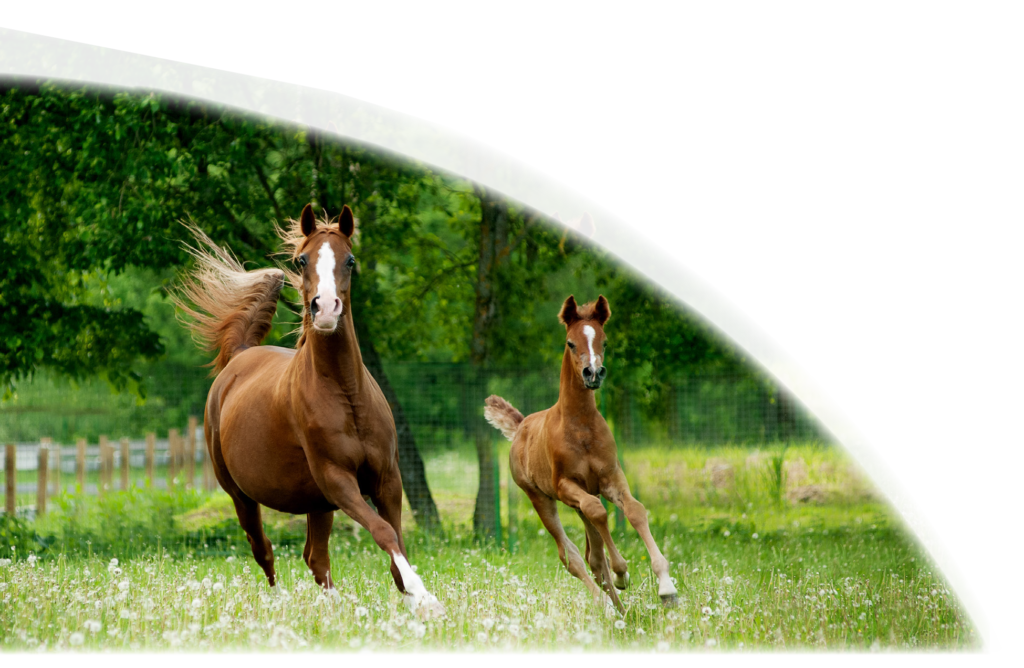Click here to view as a pdf: Maximizing Equine Reproductive Performance
While many horse owners have horses as a hobby for enjoying the occasional fun show or trail ride, there is a business side to the equine industry as well. Horse racing, polo, and competitive jumping are just a few different segments that make up the diverse economy of the horse world. According to the American Horse Council Foundation’s 2017 National Economic Impact Study, the equine industry contributes approximately $50 billion to the U.S. economy annually and helps create 988,394 jobs ¹.
Equine breeding facilities focus on raising foals that have potential to become superior equine athletes. The success of a breeding facility depends on the performance of the foals they produce. Success starts with the pairing of a stallion and a mare. Many factors can affect whether the mare becomes pregnant and has a healthy foal that will reach its full genetic potential. Over the course of the next three newsletters, Crystal Creek® will be taking an in-depth look at how summer/heat stress, nutrition, and biosecurity considerations can affect equine reproductive performance.
This article will discuss the impact summer/heat stress can have on equine reproduction and the tools Crystal Creek® has available to help minimize summer stress’ negative effects.
Effect of Heat Stress
Heat Stress is defined as “an environment that acts to drive body temperature above a set-point temperature ².” Breeding facilities commonly keep horses in stalls. Stalls are a great option when horses need to be separated but they can also be hot, have reduced air quality and have increased fly pressure. All of these factors cause additional stress to the horse.
The breeding season can be a very stressful time for both stallions and mares. Transporting horses to and from breeding facilities and performing artificial insemination procedures can all impact the reproductive performance of the horse.
When evaluating a stallion’s reproductive performance, it is important to remember that sperm are very sensitive to temperature. To keep sperm viable, they must be maintained at 3-4 degrees below body temperature. Prolonged exposure to elevated temperatures can cause sperm abnormalities, dysfunction and even death. The effect of heat stress on sperm quality can be evident within a few days and can last as long as 70 days ³.
Mares can also be impacted by heat stress. Environmental and exercise-induced heat stress can both have negative effects on ovulation. Extended exposure to environmental heat stress with elevated temperatures and increased humidity can cause a decrease in embryo quality. Studies show mares that experience exercise-induced heat stress have a significantly lower embryo recovery rate compared to non-exercised mares ³.
Crystal Creek® Summer Equine Stress Solutions
Ventilation
Proper ventilation should be utilized for heat abatement, improving air quality and reducing fly pressure. Prolonged periods of heat stress can cause dehydration, heatstroke, muscle dysfunction and even colic. While ceiling and box fans can provide airspeed for some heat abatement, they do not improve air quality inside the stall.
Reducing moisture/condensation levels, dust and air particles, ammonia content, pathogens, and odor contamination are all key to improving air quality. The Crystal Creek® FLAP DUCT® ventilation system can address all these areas of need with one system.
When using the Crystal Creek® FLAP DUCT® ventilation system, we are able to meet, and even exceed, these requirements. FLAP DUCT® is able to provide fresh air year-round and can easily be adjusted to control the speed and volume of the air no matter what the season. FLAP DUCT® can be paired with a heating system for stables in the winter season and even automated for greater ease of use. The ability to reduce heat stress and provide a more comfortable environment for the horse can have a positive impact on the horse’s overall well-being and the entire reproductive cycle.
Fly Control
Flies are known to spread disease, cause stress and agitation, and leave swelling and inflammation from their painful bites. Flies can be an irritating physical annoyance but they can also cause animals to become distressed to the point of interfering with animal health and performance. A constant high exposure to flies can elevate an animal’s stress level causing a chronic exposure to cortisol, eventually resulting in a decreased immune function. Using an effective fly repellent is crucial during the reproductive process to minimize the effects of stress created by fly pressure.
Crystal Creek® Crystal Advantage® Equine Fly Repellent is a natural, economical tool that provides safe, effective relief from flies. A recent efficacy trial using the Crystal Creek® Crystal Advantage® Equine Fly Repellent produced an 87% fly repellency rating and performed particularly well repelling stable flies, who are known to be very aggressive. Anytime a fly repellent scores above a 70% repellency rating, it is considered an effective product. Crystal Creek® Crystal Advantage® Equine Fly Repellent can be used as a spray or wiped on for more sensitive areas such as the face and ears. It is available in a ready to use 32 oz. spray bottle or a concentrated 32 oz. bottle that can be diluted with water at a 1:1, 1:2 or 1:3 ratio. In addition to an effective fly repellent, it is important to use other fly control methods such as keeping the facility clean of manure and other waste, dumping out stagnant water and disposing of left over feed to discourage areas flies may be attracted to.
Nutritional Support
Providing high-quality nutrition is extremely important to give stallions and mares the greatest probability of reproducing. Once conception takes place, the mare will need a ration that provides for additional nutritional requirements above maintenance levels due to fetal growth. Crystal Creek® Crystal Advantage® Equine Mineral is a highly bioavailable source of minerals and vitamins that help support immune health, endurance, and overall performance. The chelated minerals used in the Crystal Creek® mineral line are shown to be over 90% available to the animal.
Crystal Advantage® Digestive Support is a pelleted supplement that can be used in addition to the Crystal Advantage® Equine Mineral during times of extra stress or transition. This product is used strategically to help manage the negative impacts stress can have on equine performance. It is designed to be fed a week before, during and after a stressful event (such as breeding). For chronic/ongoing issues, Crystal Advantage® Digestive Support can be fed daily for longer periods of time. The naturally derived ingredients in Digestive Support have been scientifically proven to:
- Stimulate the immune system along the gastrointestinal tract
- Decrease inflammation by selective COX-2 inhibition
- Promote nutrient absorption in the lower gastrointestinal tract
Crystal Advantage® Digestive Support contains aloe and cumin, which have research supporting their effectiveness for anti-inflammatory effects. Aloe has been shown to support both immune function and digestion during times of stress or challenge.6 Cumin acts as an anti-inflammatory, as well as an antioxidant. Research supports cumin is effective against neurological problems such as anxiety.7 Reducing the negative impacts of stress on a horse is another great tool that can improve overall reproductive performance.
Stress can affect horses in a number of different ways. Crystal Creek® has tools to help. When stress is reduced, it can have a positive impact on equine performance, including reproduction. For more information on effective stress-reducing methods for your horses, contact Crystal Creek® today.



